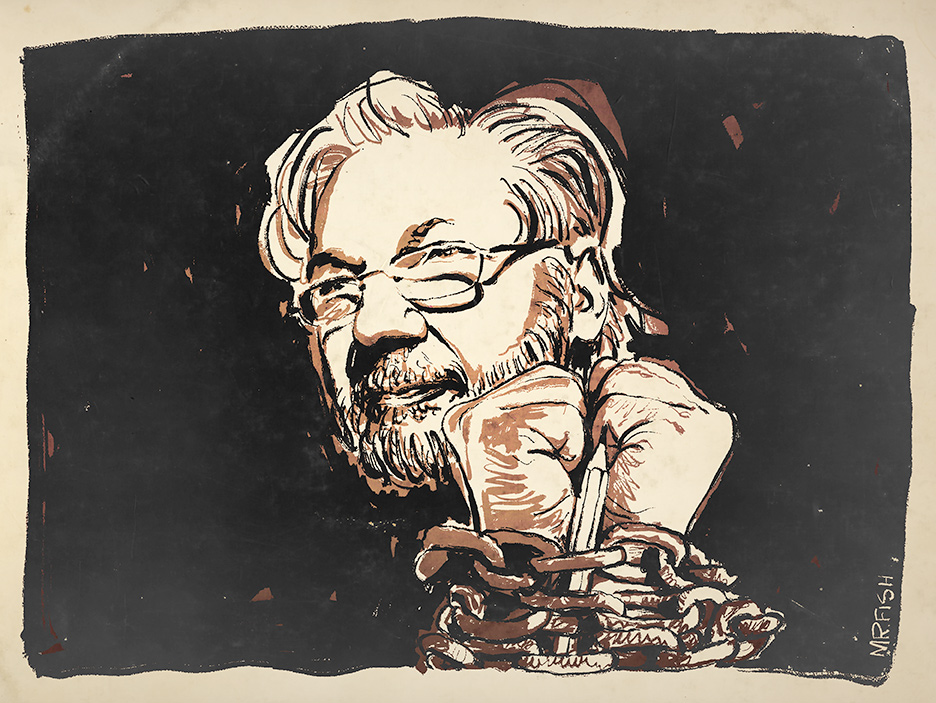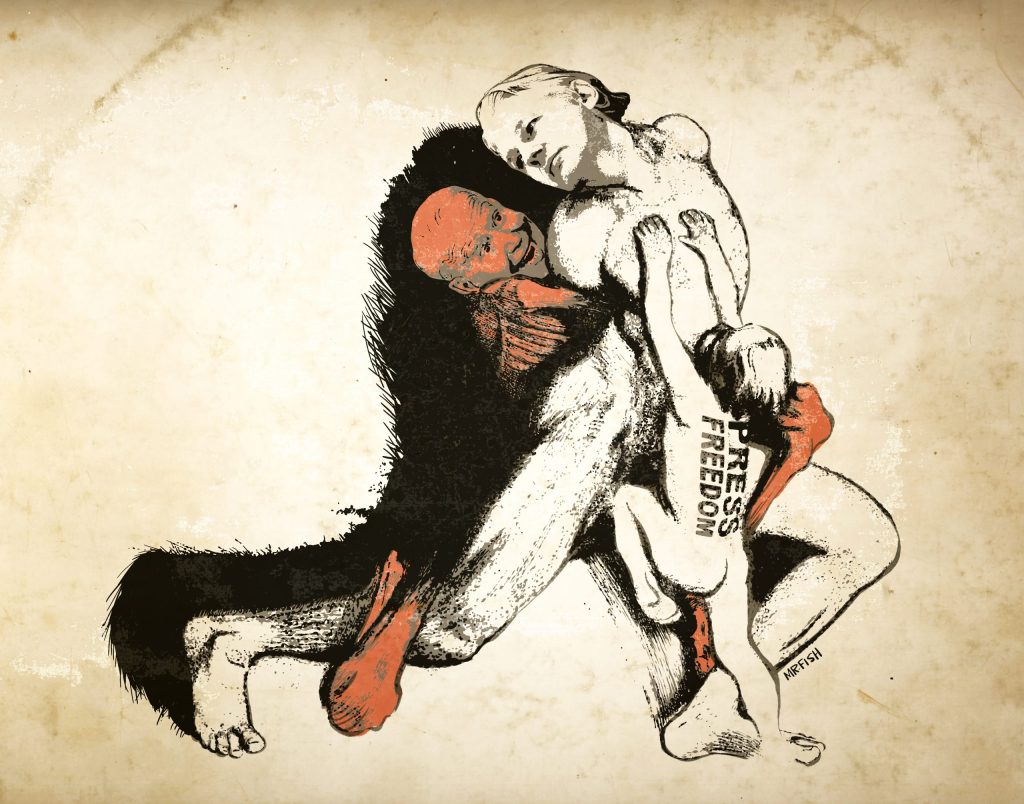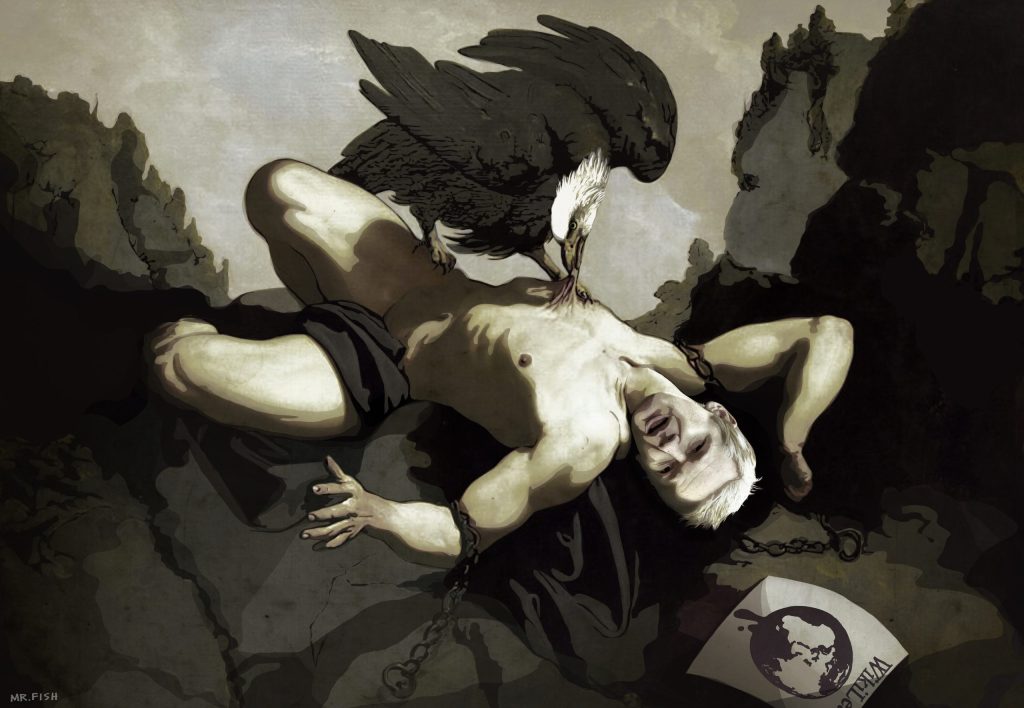On the 25 April 2022, Louise Nimmo reported in The Italian Insider
ROME – Italian senators, journalists and cultural leaders, as well as numerous Members of the European Parliament, have signed a letter addressed to British Home Secretary Priti Patel warning of the consequences on freedom of speech if she chooses to extradite Wikileaks founder Julian Assange to the United States, political sources said.
In the United States, Assange faces a sentence of up to 175 years in prison for helping to spread confidential documents on war crimes committed by US forces in Iraq and Afghanistan.
The 51-year-old Australian national is currently awaiting the decision of the London government, which is due to be made within 28 days.
He faces 17 charges against him. US magistrates accuse him of conspiring to obtain information that was then disseminated on Wikileaks, which revealed, among other things, the thousands of civilians killed by the USA during the wars in Afghanistan and Iraq, as well as secret units of the armed forces (Task Force 373) which intended to kill the Taliban without trial.
“What we fear,” reads the letter, “is, on the one hand, the extension of Assange’s detention, the consequences of which could prove fatal for the accused and, on the other, a warning to the press to refrain from collecting and disclosing information even if disseminated in the public interest.”
Among the signatories of the letter there are members of the Democratic and the Free and Equal party. The president of the Anti-Mafia commission Nicola Morra also signed, as did the president of the Press Federation Beppe Giulietti.
The following is the text of the letter from the exponents of politics, journalism and culture sent to the British Minister of the Interior Priti Patel:
We, the undersigned men and women from the world of politics, journalism and academia, turn to you in view of the crucial decision that you are called to take with respect to the extradition request of the publisher and journalist Julian Assange, urging you not to accept this request. We believe that the decision will mark a fundamental page of the right to know, as well as the life of the accused and the condition of the rule of law.
For three years, Julian Assange has been in pre-trial detention in a maximum security prison without any court having pronounced any definitive sentence against him. To them we must add another nine: it was Dec. 7, 2010, when he spontaneously introduced himself to Scotland Yard following a European mandate, issued by the Swedish judiciary, resolved with its dismissal. Since then, Assange has continued to face uninterrupted forms of detention.
The founder of Wikileaks contributed to the understanding of the reasons why a democracy cannot and must not be at the origin of serious violations of human rights to the detriment of hundreds of thousands of civilians already oppressed by the bullying of despots and the absence of fundamental rights .
The main international institutions and organisations dedicated to the defence and promotion of human rights have spoken out in favour of the release of Julian Assange. These are the same democratic institutions, founded following the devastation of the Second World War, to which we look with confidence and which have for some time been presenting a request to which we join and renew them: the end of the detention of Julian Assange.
On Dec. 4, 2015, the UN Group of Experts on Arbitrary Detention stated that “the adequate remedy would be to guarantee Mr. Assange and to grant him the executive right to compensation, in accordance with Article 9 (5) of the International Covenant on Civil and Political Rights.”
On Dec. 21, 2018, the same Group specified that “States that base themselves and promote the rule of law do not like to deal with their own violations of the law. This is understandable. But when they honestly acknowledge these violations, they honour the very spirit of the rule of law, earn greater respect, and set a laudable example around the world.”
On April 5, 2019, the UN Special Rapporteur on torture, Nils Melzer, said he was alarmed by the possible extradition as the accused would risk suffering serious violations of his human rights, cruel, inhuman or degrading treatment or punishment, loss of freedom. of expression and deprivation of the right to a fair trial. On May 9 of the same year, Melzer visited Assange and found symptoms of “prolonged exposure to psychological torture.”
On April 11, 2019, the UN Special Rapporteur on extrajudicial executions, Agnes Callamard, said that the UK arbitrarily arrested the controversial publisher “probably endangering his life.” This statement is shared by the United Nations Special Rapporteur on the situation of human rights defenders, Michel Forst.
On Feb. 20, 2020, Council of Europe Commissioner for Human Rights, Dunja Mijatovic, said: “Julian Assange’s potential extradition has human rights implications that go far beyond his individual case. The indictment raises important questions about the protection of those who publish confidential information in the public interest, including those exposing human rights violations. (…) any extradition in which the person involved is at real risk of torture or inhuman or degrading treatment is contrary to Article 3 of the European Convention on Human Rights.”
Finally, on Dec. 10, 2021, Reporter Without Borders Secretary General Christophe Deloire said, “we firmly believe that Julian Assange has been targeted for his contributions to journalism and we defend this case because of its dangerous implications for the future of journalism and press freedom in the world.”
What we fear is, on the one hand, the extension of Assange’s detention, the consequences of which could prove fatal for the accused and, on the other, a warning to the press to refrain from collecting and disclosing information even if disseminated in the public interest. We are convinced that it is possible to allow public opinion to know the reasons behind crucial political-military decisions without this conflicting with the security needs of citizens.
For these reasons, we appeal to you, Minister, not to give the green light to the extradition of Julian Assange.
Signatories
Gianni Marilotti, senator
Andrea Marcucci, senator
Riccardo Nencini, senator
Roberto Rampi, senator
Elvira Evangelista, senator
Luciano D’Alfonso, senator
Tatiana Rojc, senator
Sandro Ruotolo, senator
Maurizio Buccarella, senator
Luisa Angrisani, senator
Danila De Lucia, senator
Francesco Verducci, senator
Mino Taricco, senator
Monica Cirinnà, senator
Andrea Ferrazzi, senator
Nicola Morra, senator
Paola Boldrini, senator
Primo Di Nicola, senator
Silvana Giannuzzi, senator
Giuseppe Pisani, senator
Gisella Naturale, senator
Francesco Giacobbe, senator
Luigi Di Marzio, senator
Elena Botto, senator
Fabrizio Ortis, senator
Margherita Corrado, senator
Fabrizio Trentacoste, senator
Simona Nocerino, senator
Marco Croatti, senator
Nicola Morra, senator
Mattia Crucioli, senator
Emma Pavanelli, senator
Maria Laura Mantovani, senator (33 senators)
Sabrina Pignedoli, MEP
Clare Daly, MEP
Mick Wallace, Member of the European Parliament
Francesca Donato, MEP
Martin Buschmann, MEP
Dino Giarrusso, MEP
Pierre Larrouturou, MEP
Ivan Vilibor SINČIĆ, MEP
Gunnar Günter BECK, MEP
Chiara Maria Gemma, European deputy
Carles Puigdemont, MEP
Antoni Comín, MEP
Clara Ponsatí, MEP
Rosa D’Amato, member of the European Parliament
Joachim Kuhs, MEP
Marcel de Graaff, MEP
Stelios Kouloglou, MEP
José Gusmão, MEP
Daniela Rondinelli, MEP
Ignazio Corrao, MEP
Diana RIBA I GINER, MEP
Marisa Matias, European deputy
Gunnar Beck, MEP
Laura Ferrara, member of the European Parliament
Özlem Alev Demirel, MEP
Eleonora Evi, European deputy
Vincenzo Vita, former parliamentarian and former undersecretary for telecommunications
Alberto Maritati, former senator and former undersecretary of justice
Gian Giacomo Migone, former senator and former president of the Foreign Comm. Senate
Luciana Castellina, former deputy
Aldo Tortorella, former deputy
Alfonso Gianni, former deputy
Gianni Tamino former member of parliament and former member of the European Parliament
Beppe Giulietti, president of Fnsi
Tommaso Di Francesco, co-director of Il Manifesto
Giovanni Terzi, journalist
Elisa Marincola, Article 21 spokesperson
Stefano Corradino, director of Articolo21
Valerio Cataldi, journalist
Paolo Barretta, Charter of Rome
Stefania Maurizi, journalist
Salvatore Cannavò, journalist
Pier Virgilio Dastoli, professor of EU law
Marino Bisso, journalist, NoBavaglio Network
Daniele Lorenzi, president of Arci
Danilo De Biasio, director of the Human Rights Festival
Lorenzo Frigerio, Free Information coordinator
Paola Slaviero, writer
Nicoletta Bernardi, computer science at the University of Perugia
Francesco Maggiurana. pianist
Gemma Guerrini, former city councillor and researcher, Aipd member
Read original article in The Italian Insider




